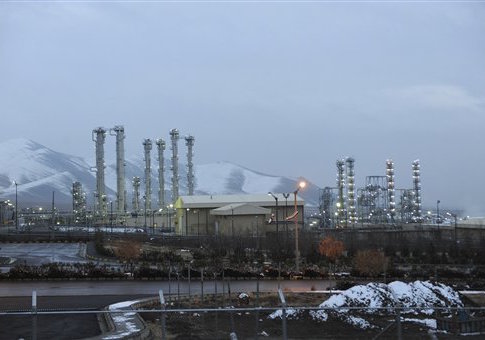U.S. and Iranian officials confirmed Thursday that no American nuclear inspectors will be permitted to enter the country’s contested nuclear site under the parameters of a deal reached with world powers this week, according to multiple statements by American and Iranian officials.
Under the tenants of the final nuclear deal reached this week in Vienna, only countries with normal diplomatic relations with Iran will be permitted to participate in inspections teams organized by the International Atomic Energy Agency (IAEA).
The revelation of this caveat has attracted concern from some analysts who maintain that only American experts can be trusted to verify that Iran is not cheating on the deal and operating clandestine nuclear facilities.
The admission is the latest in a series of apparent concessions made by the United States to Iran under the deal. Other portions of the agreement include a promise by the United States to help Iran combat nuclear sabotage and threats to its program.
"Iran will increase the number of designated IAEA inspectors to the range of 130-150 within 9 months from the date of the implementation of the JCPOA, and will generally allow the designation of inspectors from nations that have diplomatic relations with Iran, consistent with its laws and regulations," the deal states, according to text released by the Russians and Iranians.
Susan Rice, President Obama’s national security adviser, confirmed this in an interview with CNN.
"There are not going to be independent American inspectors separate from the IAEA" on the ground in Iran, Rice said. "The IAEA will be doing the inspections on behalf of the U.S. and the rest of the international community."
Rice said that the Obama administration trusts those countries whose relations with Iran are normalized to carry out inspections of the Islamic Republic’s sensitive nuclear sites.
"The IAEA, which is a highly respected international organization will field an international team of inspectors, and those inspectors will in all likelihood come from IAEA member states, most of whom have diplomatic relations with Iran," Rice said. "We of course are a rare exception."
Elliott Abrams, a former White House National Security Council director under George W. Bush, criticized the administration for consenting to Iranian demands.
"It's ironic that after Wendy Sherman told us about how Kerry and Zarif had tears in their eyes thinking about all they had accomplished together, we learn that the Islamic Republic won’t allow one single American inspector," Abrams said, referring to John Kerry and Javad Zarif, Iran’s foreign minister. "No member of the P5+1 [negotiating team] should be barred, and this is another example of how badly the administration negotiated."
"We should have insisted that the ‘no Americans’ rule was simply unacceptable," Abrams said. "But there was no end to U.S. concessions."
One American source who was present in Vienna for the talks said the ban on all U.S. inspectors is the result of Iranian demands in the negotiating room.
"The administration promised the American people and their lawmakers that we would be implementing the most robust inspection regime in the history of the world and that we would know what’s happening on the ground," the source said. "Now they tell us America can’t have anything to do with the inspection regime because we don’t have diplomatic relations with Iran. I guess we should be grateful they’re not solving this problem by opening up a U.S. embassy in Tehran."
Obama administration officials also admitted recently that promises for "anytime, anywhere" inspections of Iran’s nuclear sites were a rhetorical flight of fancy.
"I think this is one of those circumstance where we have all been rhetorical from time to time," lead U.S. negotiator Wendy Sherman told reporters this week. "That phrase, ‘anytime, anywhere,’ is something that became popular rhetoric, but I think people understood that if the IAEA felt it had to have access, and had a justification for that access, that it would be guaranteed, and that is what happened."
U.S. concessions on the structure of the inspections regime have allowed Iran to delay inspections of sensitive sites for at least 24 days.
